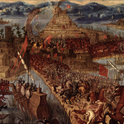The noblest acquisition of mankind is speech, and the most useful art
is writing. The first distinguishes man from the brute creation; the second from uncivilised savages.
T Astle, the origin and progress of writing, 1784
The modern pencil was invented at the end of the 18th century, followed some 50 years later by the nibbed pen. Until then those who were both literate and dextrous-and that was not many-wielded a quill. With pens and pencils handwriting became a push-over, even for the ham-fisted. So that in the past century, in the western world, the ability to write has become almost universal. But now the writing may be on the wall.
If you want to be richer than Bill Gates, handwriting is probably not the ideal market to get into right now. Since 1993 consumer expenditure on pens and pencils of all kinds (at constant prices) has fallen by about 25 per cent. At this rate of decline, handwriting in Britain will be all but extinct in under 30 years. It may sound fanciful, but it's conceivable. Computers which type directly from speech are already with us, and already perform almost perfectly. Why struggle with blunt lead and blotchy ball pens when you can mumble into a microphone and see your mouthings transformed instantly into admirably grammatical prose? Nowadays even little notes can be jotted down on little computers: watch the parking wardens.
Most universities now insist that essays and other documents be typed, rather than handwritten. Increasingly, newspapers and magazines demand that copy be sent to them by e-mail, so it travels directly from the writer's screen to the editor's screen-as this has done-without ever touching the intermediary of paper (or "hard copy" as we anoraks call the printed word). Most business people now type their own documents. I doubt whether any publisher would nowadays even contemplate reading a book submitted in manuscript, no matter how beautifully calligraphed. So the educated, the professional writers and business people are all using word processors. Will handwriting, then, progressively become the prerogative of only the less literate?
If you write with a word processor-and it's a fair bet you do-you rarely clench you fingers around an old-fashioned writing implement except to sign your name or scrawl the briefest of messages. Why should you? Handwriting is neither a natural nor a comfortable activity. Before too long, somebody is going to argue that teaching children to write is senseless. And their case will be hard to refute. It isn't necessary to write-that is to hand write-to be able to read. People can be highly literate, but hardly capable of manoeuvring a pen. Many of the population might eventually be unable even to sign their names. They couldn't a century ago. Yet we have become so accustomed to binding ourselves in scribble-from managing our finances to getting married-that a world without signatures is difficult to envisage.
If writing is becoming a superfluous skill, as redundant as the coccyx, what effect will the ubiquitous use of word processors have on people's prose styles? Word processors make revision so easy, and so quick, that their use should enable writers always to get things right. Or in any case exactly how they want them. (And modern software corrects spelling and grammar in a trice.) Writers' manuscripts throughout history have shown that almost all authors revise and revise obsessively. So word processors should be heaven sent to anyone who writes a lot. But are they?
Though I became a word processing zealot a few years ago I still wonder whether my little laptop is an unalloyed blessing.
In the first place, I had (without knowing it) learned to synchronise my writing and thinking. My mind had taught itself to go at the same speed as my pencils. On the word processor my thoughts and words are constantly out of kilter. I hope they'll one day get together again.
Second, knowing how easy it is to revise, my first drafts are much more slapdash than they used to be. Pushing a pencil across paper is modestly hard work. So I would think carefully before launching my wrist across blank sheets. Fingering an electronic keyboard is all too easy. But once something has been drafted poorly, it can be the devil's own job to get it right.
Third, the professional appearance of "printed" words glowing on a silver screen is awfully seductive. It makes the words look far finer than they are. On a screen almost any old trash reads wonderfully.
Fourth, I am convinced the eye travels across a screen much faster than across a printed page. This can significantly alter the rhythm of sentences and paragraphs. And since the ultimate readers of most things will see them on paper (e-mails excepted) it is wise, in my view, to print out everything drafted on the computer, revise it (with an old-fashioned pen or pencil) and transcribe the hand-written corrections back onto the screen.
Despite all of which, I am a man besotted. For me, scribbling on a keyboard is one of life's great joys. I don't miss writing by hand one little bit. So it wouldn't surprise me at all, nor even grieve me much, if after no more than a century of popular use, handwriting is written off.











